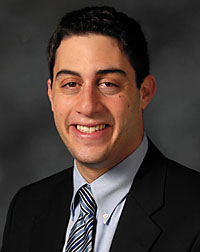 | Avi Feller |
Four Yale College seniors and one student in the Yale Graduate School are among the 32 Americans who will study at Oxford University next year as Rhodes Scholars.
The four members of the Class of 2007 selected as Rhodes Scholars are Avi Feller, Whitney Haring-Smith, Maya Shankar and Amia P. Srinivasan. Doctoral student Aaron F. Mertz is Yale's fifth Rhodes recipient.
Among the most well-known and coveted of awards for international study, Rhodes Scholarships were created in 1902 at the bequest of British philanthropist Cecil Rhodes. The award provides all expenses for two or three years of study at the University of Oxford in England to those students who best exemplify "academic achievement, integrity of character, a spirit of unselfishness and leadership potential."
Profiles of this year's winners follow:
Feller, from Scottsdale, Arizona, is a political science and applied mathematics major, who sees the statistical analysis of social interaction as a new frontier in political science.
The Yale senior says much of the work done in the social sciences since the 1960s has ignored the social element of voting behavior. His work, begun at Yale with Professors Donald Green and Alan Gerber, uses the tools of statistics to "experimentally measure voting behavior in addition to talking about networks in a meaningful way," he says.
Feller intends to pursue two master's degrees while at Oxford -- one in applied statistics, the other in political science research methods -- and hopes to continue the work he has undertaken as an undergraduate. Statistics, he says, is not just about applying quantitative analysis, it is also about how research is conducted. Feller is particularly interested in tracking voting patterns as well as matters of health and the environment.
While Feller was drawn to Oxford for its academic programs, he had another consideration in mind when applying to that university: its many and diverse musical venues. An avid singer who had leading roles in opera productions and a member of Yale Collegium Musicum, Feller intends to apply to a college at Oxford with a particularly strong chapel choir program, he says.
Going to Oxford on a Rhodes Scholarship, Haring-Smith will follow in the footsteps of his great-grandfather, Clarence Haring, who won the award in 1907. Haring-Smith, from Pennsylvania, is a political science major and a candidate for simultaneous award of his bachelor's and master's degrees in political science from Yale.
The résumé of this Rhodes scholar includes working for the U.S. secretary of defense on western hemisphere affairs and for the U.N. high commissioner for refugees in Sri Lanka. His most recent summer job was helping a U.N. mission to disarm warlords in Afghanistan.
Haring-Smith sees making policy for the U.S. government as part of his future: "What I hope to achieve is a smart security policy," he says. He contends that sustainable economic development and energy independence are essential components of security in an unstable and volatile world. The winner of a Udall Scholarship for his environmental work at Yale and in New Haven, Haring-Smith believes fervently that the United States should develop more self-sufficient sources of energy. "Reliance on foreign energy distorts foreign policy," he says, noting that breaking America's dependence on foreign oil is essential for stability in the Middle East.
Like fellow Rhodes scholar Srinivasan, Haring-Smith has a passionate interest in the theater. That interest figured in his decision to attend Yale, he says, rather than Harvard, where he had also been accepted. Yale's "meaningful curricular theater program" tipped the balance. Having declined a Marshall Scholarship to accept the Rhodes, Haring-Smith intends to pursue a doctorate in politics at Oxford.
Shankar, from Cheshire, Connecticut, gained national recognition earlier this year as one of Glamour Magazine's Top Ten College Women.
A cognitive science major, Shankar wants to pursue her studies of behavioral cognition at Oxford next fall. "Life is pretty unpredictable," she says of her own experience.
A gifted violinist who had the distinction of playing at Carnegie Hall with her teacher Itzhak Perlman, Shankar was derailed from her promising musical career when she developed a chronic inflammation of the tendons in her hand. She subsequently shifted her focus from music to "multi-sensory research." Shankar attributes this segue to a number of factors. A book by Steven Pinker, "How the Mind Works," first inspired her to learn more about the human brain. Her professors at Yale, she notes, "helped channel my resources." In addition, her father, Ramamurti Shankar, a physics professor at Yale, was a "wonderful role model," she says, and has inspired her to pursue an academic career.
Shankar says her musical training has left her with the sense that one must be "passionate" about what one does and has instilled in her a strong work ethic, which she continues to draw on. "Music is still part of my life," Shankar notes. "I listen to Beethoven's violin concerto once a day."
Srinivasan is a philosophy major with a truly cosmopolitan background, having spent her childhood in cities all over the world. Srinivasan was born in Bahrain, and has lived in Taiwan, Singapore, London and New York.
As a student of philosophy, she is drawn to the intersection of aesthetics and ethics and extemporizes freely on how art became "emancipated" from all ethical function in the 20th century. According to Srinivasan, a class with Yale professor Karsten Harries steered her to study architecture, an art form in which how things look and how they affect society are intertwined. Srinivasan has written articles on philosophers Kierkegaard and Heidegger that have been published in scholarly journals, and she founded a scholarly journal at Yale, the Yale Philosophical Review.
Srinivasan is also grounded in the real world of local politics, having served as Democratic co-chair of New Haven's Ward 1. In addition, she is a playwright whose "philosophically themed" plays have been performed at Yale and elsewhere. She feels as passionate about this creative pursuit as she does about philosophy, and intends to continue with it while earning a B.Phil. in philosophy at Oxford.
While traveling to foreign shores has been second nature to the Yale senior, "I think of Yale as home," she says.
Mertz, from Palatine, Illinois, in the Chicago area, is a first-year doctoral candidate in physics at Yale, though he is listed on the Rhodes roster according to the institution that endorsed him as an undergraduate, Washington University in St. Louis.
A modern Renaissance man, Mertz is equally at home doing research on the isotopic composition of meteorites, publishing a paper on the anthropological connection between Indian basket-makers and white women during the Arts and Crafts movement, and playing the cello in the piano trio he founded.
Having pursued a double major in college, in American culture studies and physics, Mertz finds that science and the humanities complement each other as intellectual pursuits. "Physics doesn't explain the human condition," he observes. The answer to what motivates human behavior is to be found in the humanities, he concludes.
Mertz, who counts a Barry Goldwater Scholarship and a Lucent Global Science Scholarship among his long list of honors, will study the history of science, medicine and technology at Oxford. He is especially interested in delving into the issue of how science and society relate to each other. He says he wants to answer the fundamental question: "What is the public perception of science?" He will continue his graduate studies in physics after his time as a Rhodes Scholar and says a Ph.D. in science will give him the authority he needs to fulfill his ultimate ambition: to become a "public intellectual" -- that is, an advocate for the sciences to a public that seems to have become distrustful of scientists, he explains.
T H I S
Yale boasts five Rhodes Scholars
Avi Feller
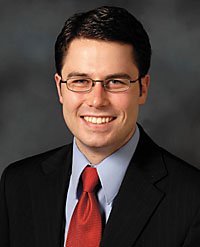
Whitney Haring-Smith
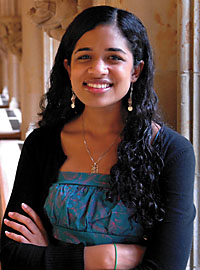
Maya Shankar
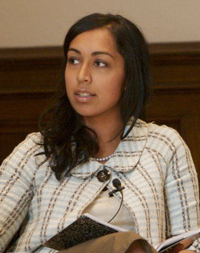
Amia P. Srinivasan
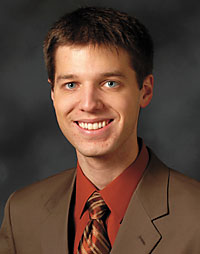
Aaron F. Mertz
 W E E K ' S
W E E K ' S S T O R I E S
S T O R I E S![]()
 Yale launches podcast library on iTunes
Yale launches podcast library on iTunes![]()
![]()
 Japan gives top civilian honor to Yale scholar
Japan gives top civilian honor to Yale scholar![]()
![]()
 Lin: Great care needed in studying 'finicky' stem cells
Lin: Great care needed in studying 'finicky' stem cells![]()
![]()
 Yale SOM renames center in honor of Ira Millstein . . .
Yale SOM renames center in honor of Ira Millstein . . .![]()
![]()
 Grant supports research on risk factors for testicular cancer
Grant supports research on risk factors for testicular cancer![]()
![]()
 Researchers to study age-related decline of sense of smell
Researchers to study age-related decline of sense of smell![]()
![]()
 University begins mandatory training for faculty involved with grants
University begins mandatory training for faculty involved with grants![]()
![]()
 Coat color may not be indicator of species in lemurs, say researchers
Coat color may not be indicator of species in lemurs, say researchers![]()
![]()
 Scientists trace evolution of one of the earliest multi-cellular life forms
Scientists trace evolution of one of the earliest multi-cellular life forms![]()
![]()
 Study shows seat of emotions in the brain may also contribute . . .
Study shows seat of emotions in the brain may also contribute . . .![]()
![]()
 Troupe hopes to dispel stereotypes about ancient dance
Troupe hopes to dispel stereotypes about ancient dance![]()
![]()
 Nobel laureate to give public lecture on campus
Nobel laureate to give public lecture on campus![]()
![]()
 Colleagues to pay tribute to Bresnick in Carnegie Hall
Colleagues to pay tribute to Bresnick in Carnegie Hall![]()
![]()
 T.P. Ma honored for pioneering work with semiconductors
T.P. Ma honored for pioneering work with semiconductors![]()
![]()
 Symposium will examine filmmaker's 'European period'
Symposium will examine filmmaker's 'European period'![]()
![]()
 Panel will discuss reconciliation between Israelis, Palestinians
Panel will discuss reconciliation between Israelis, Palestinians![]()
![]()
 It is the jurists who will be judged at student mock trial tournament
It is the jurists who will be judged at student mock trial tournament![]()
![]()
 Renowned painting to remain on view at British Art Center
Renowned painting to remain on view at British Art Center![]()
![]()
 Gala to raise funds for research, treatment of reproductive cancers
Gala to raise funds for research, treatment of reproductive cancers![]()
![]()
 Campus Notes
Campus Notes![]()
Bulletin Home |
| Visiting on Campus
Visiting on Campus |
| Calendar of Events
Calendar of Events |
| In the News
In the News![]()
Bulletin Board |
| Classified Ads
Classified Ads |
| Search Archives
Search Archives |
| Deadlines
Deadlines![]()
Bulletin Staff |
| Public Affairs
Public Affairs |
| News Releases
News Releases |
| E-Mail Us
E-Mail Us |
| Yale Home
Yale Home